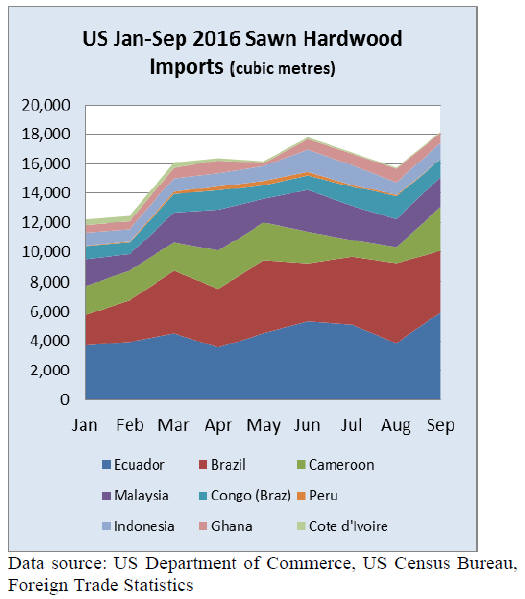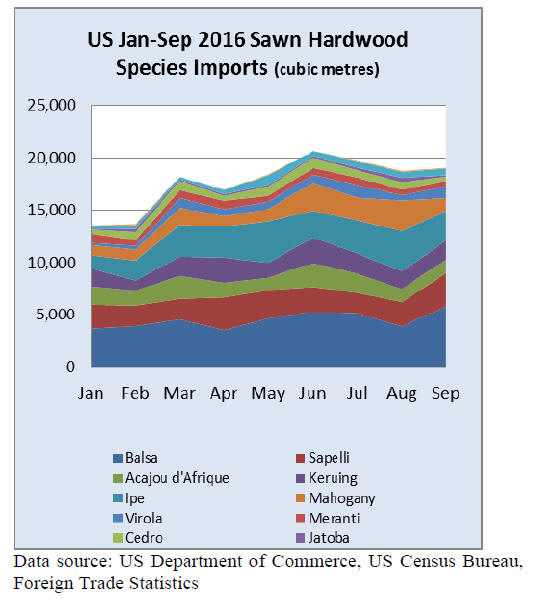|
Report from
North America
US tropical sawn hardwood imports unchanged except
for ipe
US imports of temperate and tropical sawn hardwood fell
by one third in September from the previous month to
64,979 cu.m.
The decline was mainly in temperate hardwood imports.
Tropical sawnwood imports declined just 2% in
September to 20,695 cu.m. The value of tropical
sawnwood imported fell by 7% to US$23 million.

Imports of most tropical species increased in September
despite the overall decline. Imports of balsa, sapelli,
acajou d¡¯Afrique, keruing, virola and meranti were all up.
On the other hand, ipe sawnwood imports fell by 27%
from the previous month to 2,809 cu.m. Year-to-date
imports of ipe were down 6% from September 2015.
Mahogany imports fell 58% month-over-month to 1,219
cu.m., but year-to-date imports were higher than at the
same period last year.
Imports from Cameroon were over 3,000 cu.m. in
September. Cameroon increased shipments to the US of
sapelli (1,754 cu.m.) and acajou d¡¯Afrique (884 cu.m.).
Sapelli imports from Congo Brazzaville declined in
September to 1,119 cu.m.

Canadian hardwood imports from Brazil rise
After two months of expansion the value of Canadian
imports of tropical sawnwood slipped to US$1.40 million
in September. The September year-to-date value of
imports was still significantly higher than in September
2015. Imports of all tropical species (those that are
recorded individually) fell in September.
Canadian sapelli sawnwood imports were worth
US$212,953 in September, down one third from August.
Only a small volume of mahogany was imported into
Canada in September (US$2,604), and meranti imports fell
by more than half to US$55,313.
A few countries increased shipments to Canada in
September despite the overall decline. Imports from Brazil
were worth US$188,085 (+17%). China had supplied
some tropical hardwood in the past but in September only
US$58,981 worth of hardwood sawnwood was shipped to
Canada.
National formaldehyde emission standards for
composites
Following six years of development, stakeholder and
public input and revisions the US Environmental
Protection Agency (EPA) has issued the final rule on
formaldehyde emission standards for composite wood
products.
The EPA has worked to ensure the national standards are
consistent with California¡¯s existing requirements for
composite wood products.
The requirements will go into effect July 2017. All
composite wood products that are sold, supplied, offered
for sale, manufactured or imported in the US will need to
be labeled as TSCA Title VI compliant. These products
include: hardwood plywood, medium-density fiberboard,
and particleboard, as well as household and other finished
goods containing these products.
The final rule also establishes a third-party certification
programme for laboratory testing and oversight of
formaldehyde emissions from manufactured and imported
composite wood products.
The final rule, as well as additional resources for regulated
stakeholders, are available at:
https://www.epa.gov/formaldehyde
Federal Reserve may still raise interest rates in
December
A Reuters poll of economists taken after the US
presidential election showed a majority still expect a rise
in interest rates in December. The US Federal Reserve
originally projected four rate hikes this year but cited low
inflation and weaker than expected labour market data as
reasons for delaying rate increases.
Most economists surveyed said they were either neutral or
less optimistic about business investment conditions in the
US in the near future.
Major trade agreements with US unlikely to go ahead
The Transatlantic Trade and Investment Partnership
(TTIP) between the US and the EU will not be ratified
during President Obama¡¯s remaining time in office.
Resistance to the deal grew on both sides of the Atlantic,
but the EU Commission and the Obama administration
had hoped to finalise the agreement by the end of this
year.
An EU Trade Commissioner suggested that he expects the
Trump administration to abandon the trade agreement
despite the president-elect not mentioning the TTIP during
the election campaign. The EU signed a trade deal with
Canada at the end of October, which will eliminate tariff
on industrial products and promote investment.
An even larger trade agreement, the Trans-Pacific
Partnership (TPP) is also unlikely to go ahead because
President-elect Trump strongly opposed this in his
campaign.
The TPP involves the US and 11 other countries in the
Pacific region but excludes China, Russia and India.
President Obama promised to discuss TPP with the other
member countries at the Asia-Pacific Economic
Cooperation summit in Peru.
China indicated it would push for the Regional
Comprehensive Economic Partnership (RCEP), which
excludes North America and a Free Trade Area for the
Asia-Pacific at the summit.
US voters approve land conservation and higher
minimum wage
On November 8 Americans cast their votes in federal,
state and local elections, as well as numerous ballot
measures. Across the country 86 measures for
conservation, parks and restoration were on the ballot. Of
these 68 were passed by voters.
Overall, the 68 successful measures will
provideUSUS$6.3 billion for parks, land conservation and
restoration. Earlier this year 14 park and land conservation
ballot measures worth US$3.3 billion were approved.
Voters in four states approved raising the minimum wage
and improving benefits. A total of 14 states increased
minimum wages in 2016. The move comes amid
unemployment at pre-recession levels and labour
shortages in some industries, including residential
construction and renovation.
|